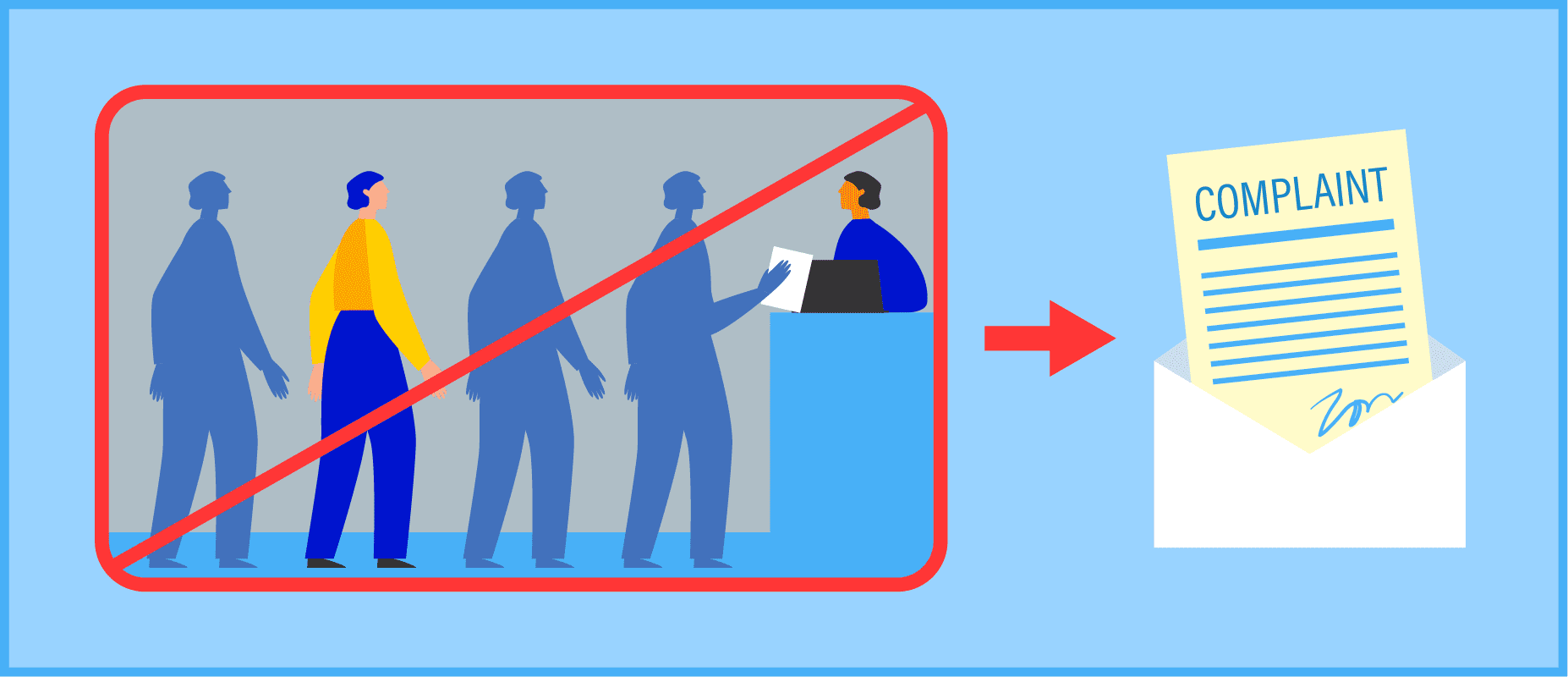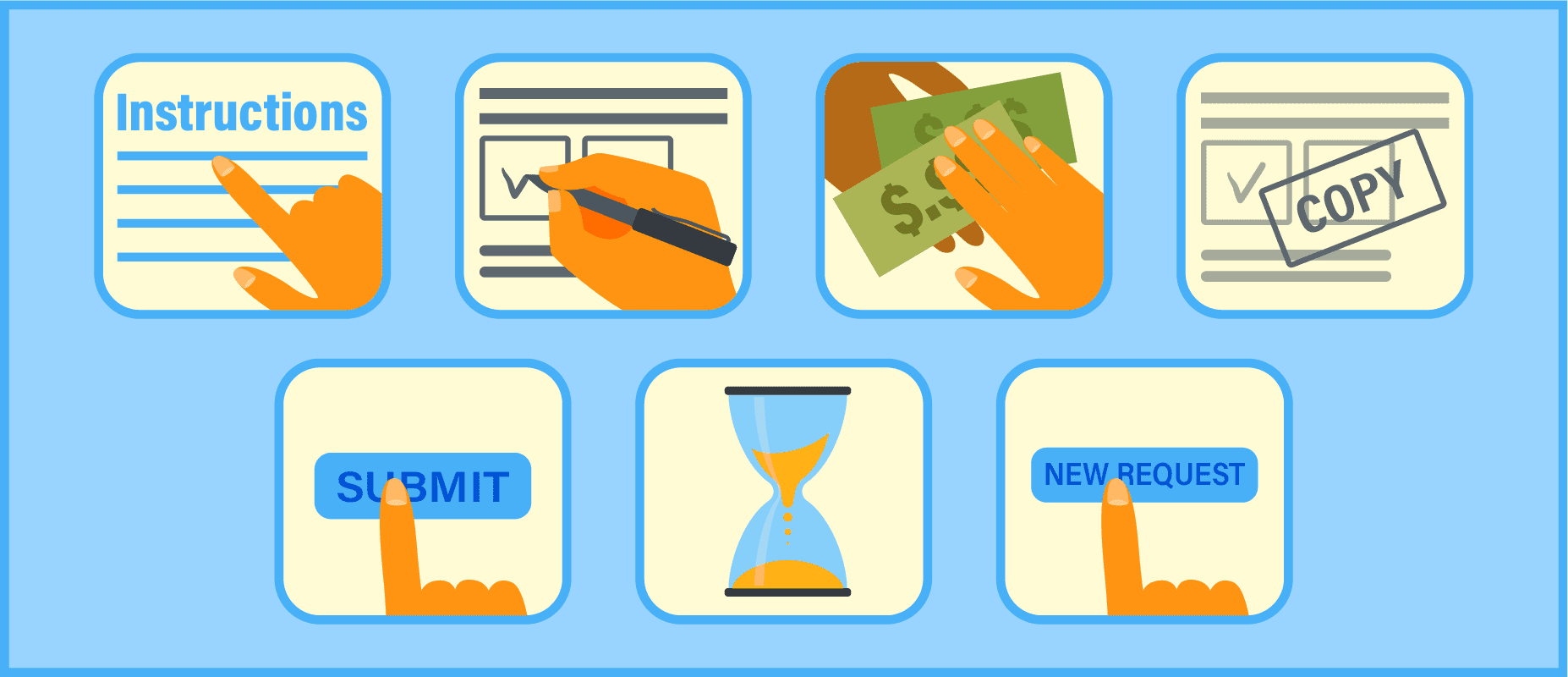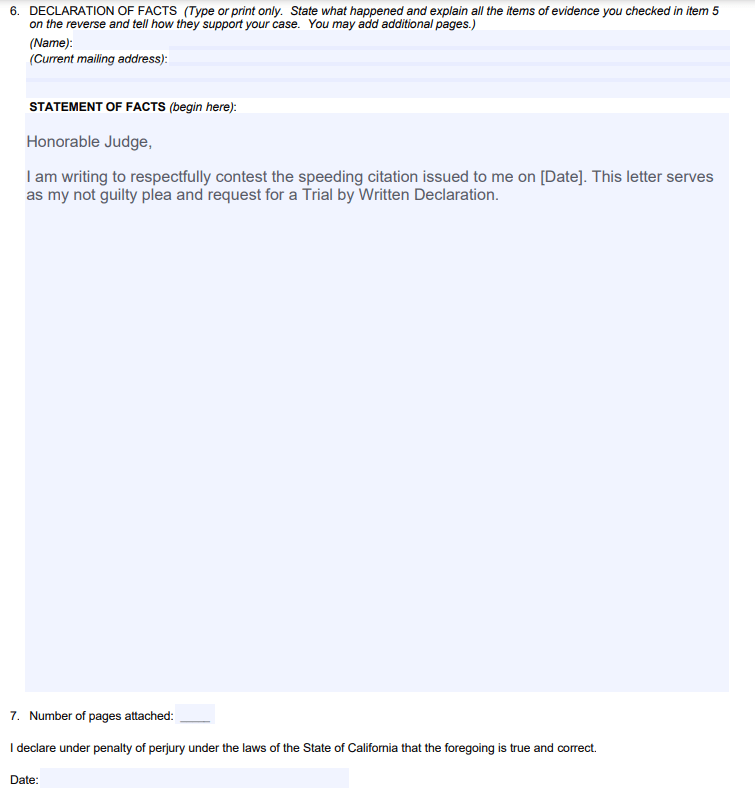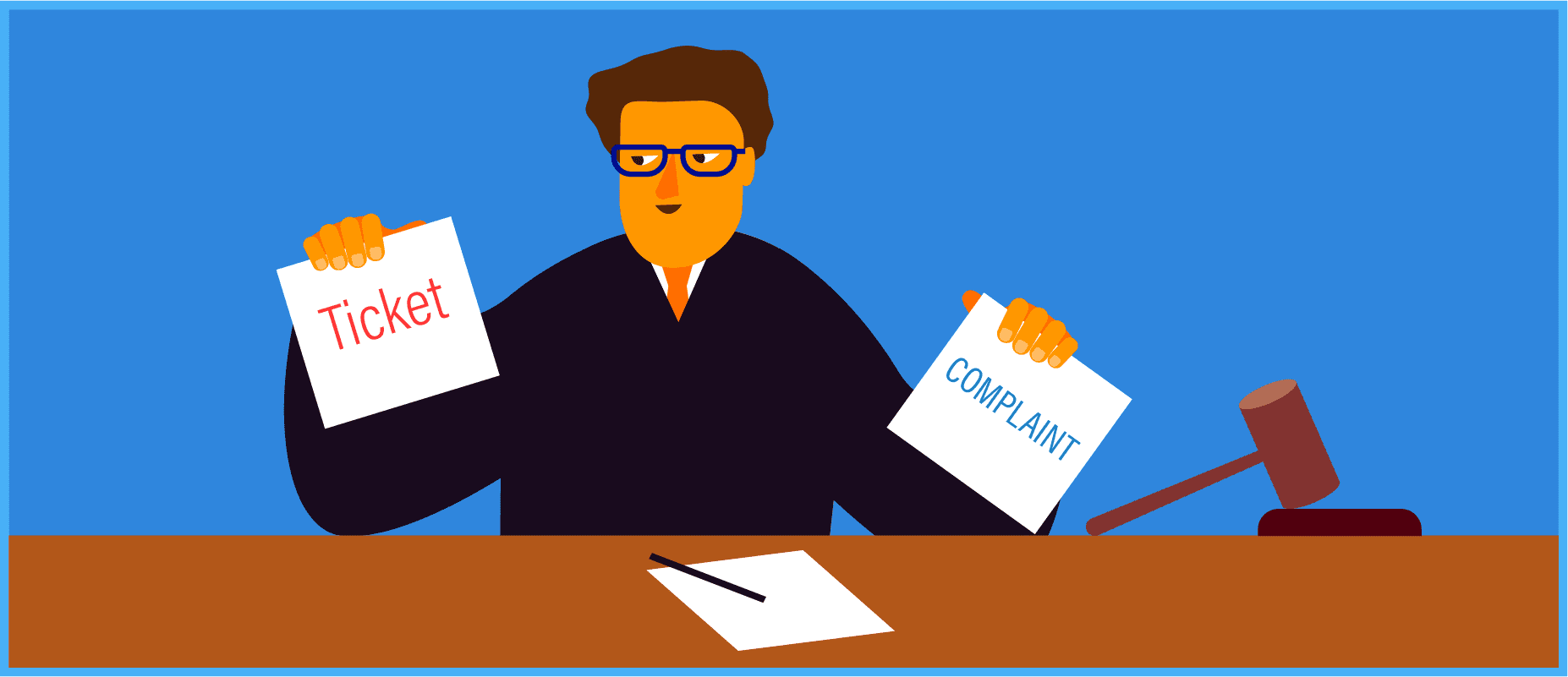Key Takeaways
- A trial by written declaration allows you to fight a traffic ticket without going to court.
- If you go this route, you’ll submit a written statement to present your case, along with supporting evidence, such as phone records or dashcam footage.
- This option is available to drivers charged with traffic infractions. You may not request a trial by written declaration for DUIs or other serious offenses.
- You may need to pay bail before submitting your declaration. If you’re found not guilty, you’ll get the bail back.
- If the ruling isn’t in your favor, you can request an in-person trial and start all over.
Dealing with a traffic ticket in California can feel overwhelming. But what if there was a hassle-free way to challenge it without stepping foot in a courtroom? Well, there is. It’s called trial by written declaration.
This option involves submitting a written statement to explain your version of the events to the court. But first, you need to make sure you’re eligible for it.
Here’s what you should know about challenging your citation in writing – and how to increase your chances of success.
What Is a Trial by Written Declaration?

A trial by written declaration is a legal procedure where you can contest a traffic ticket in writing. If you go this route, you won’t have to attend a trial in person. Instead, you’ll mail or physically bring a written statement to the court.
The statement should present and support your case, whether you’re talking about speeding tickets, red light camera tickets, or other minor offenses. The police officer who issued your ticket will make a written statement, too.
A judge will review both statements and any attached evidence and then issue a ruling.
Traffic school can help you keep a clean driving record, prevent insurance increases, and more!
Who Is Eligible for Trial by Written Declaration in California?
According to Section 40902 of the California Vehicle Code (CVC), you may have a trial by written declaration if you are charged with a traffic infraction. Listed below are some common traffic offenses that qualify for a trial by written declaration:
- Running a stop sign
- Following too closely
- Parking on sidewalks
- Making unsafe lane changes
- Driving without proper lighting
- Failure to use turn signals
- Failure to yield
- Texting and driving
You may not be eligible for a trial by written declaration if:
- You are under 18 years old
- You’ve been charged with alcohol or drug-related offenses
- You requested a trial by written declaration past the due date on the ticket (which will appear on the notice issued by the court)
- You got a ticket for a misdemeanor or other traffic offenses that can result in felony charges
- The ticket says you must appear in court
When to Choose a Trial by Written Declaration
The decision to choose a trial by written declaration depends on whether or not you’re eligible for this option. And the type and severity of the offense you are charged with.
Generally, it may be worth going this route if:
- You’re charged with a traffic violation that won’t have a major impact on your driving record. For example, running a stop sign.
- You have strong evidence in your favor, especially written records, such as GPS data, phone records, and witness statements.
- You have a high chance of winning the case.
Our recommendation is not to choose a trial by written declaration if:
- You rely on oral testimony rather than written evidence.
- Your case requires complex legal arguments.
- The stakes are high.
Let’s say you already have several points on your license and risk losing your driving privileges if you get one more point. In such cases, you may be better off going to court with a lawyer by your side.
Making a Request for Trial by Written Declaration

Most courts in California will send you a courtesy notice by mail after processing your ticket. This document should provide the following information:
- The court’s name
- What the fine (bail) is
- How to handle your ticket (e.g., have a trial by written declaration)
- The due date
If you want to request a trial by declaration, follow the instructions on the notice. If you didn’t receive the notice, contact the court that issued your ticket. Alternatively, visit the court’s website for more information.
Next, follow the steps below:
- Fill out the appropriate forms: Start by filling out Form TR-205 with your name, address, and other contact details. Also, include a statement of facts about your case, plus any relevant evidence, such as photos and dashcam footage. In some cases, you may need to submit additional forms (e.g., Form MC-031, which must be filled out by witnesses).
- Pay your bail: Depending on the court, you may need to pay all fines associated with your ticket before the due date listed on it. This is called a full bail.
- Submit the required documents: Make a copy of all your forms and written materials to keep for your own records. Then submit the original documents to the court by the due date on your notice. Attach a proof of payment if applicable. The documents can be submitted online, in person, or by mail, depending on the court’s requirements.
- Wait for the court’s decision: When you submit your materials, the court will ask the officer who issued your ticket to do the same. A judge will examine both sets of documents and make a decision by a given date. You’ll receive a notice of ruling (Form TR-215) by mail.
If you are found not guilty, the court will refund the bail amount. But if the ruling isn’t in your favor, you may need to pay additional fees and fines.
Alternatively, the court may refund a portion of the bail amount if you’re found guilty, but what you owe is less than the bail you paid.
Request a New Trial If Necessary
Defendants who are not satisfied with the court’s decision can request a new trial called “trial de novo” via Form TR-220. This must be done within 20 days of receiving the judicial ruling by mail.
If you choose this option, you and all other parties will be required to appear in court to re-adjudicate. The trial will start over from the beginning, and you will have a chance to present your evidence to the judge in person. You may also hire a traffic lawyer to represent you.
How to Write a Trial by Declaration
Before you begin writing your statement, download Form TR-205 and fill in the appropriate fields. Your written declaration will go under “STATEMENT OF FACTS.”

In this section, you must describe what happened at the time of the event and present arguments in your favor. You’ll also reference any supporting evidence to back up your claims.
Here’s how to make your declaration more compelling:
Follow a Logical Structure
Make sure the information in your statement has a logical flow. Imagine you’re writing a letter to the judge. How would you structure the letter to get your point across?
We recommend using this template:
- Introduction: Start with an introduction that outlines your argument.
- Defense/Statement of facts: Present your case and any supporting points in detail. Address any potential counterarguments.
- Conclusion: Swear under penalty of injury that your statement is true, and thank the judge for their time and consideration.
Remember to mention any evidence included with your statement, such as photos, diagrams, or phone records. For example, “Attached are photographs showing that the stop sign was not visible due to tree overgrowth.”
Stick to the Facts
Focus solely on the facts when writing your declaration. Avoid long-winded explanations and be clear about what happened, when, and why you believe you’re not at fault.
Also, refrain from making personal comments, such as “I’m a good driver and I don’t deserve this ticket” or “The police officer was rude and unfair.” Such arguments don’t hold up in court and could turn against you.
Anticipate and Address Counterarguments
Think about any potential claims the officer could make and refute them in a polite, logical manner.
For example, police officers may say they used radar or lidar technology to check your speed. These devices are good but not perfect, and their accuracy may be affected by technical errors, weather conditions, wear and tear, or other vehicles on the road.
Include these arguments in your statement to defend yourself. See if you can find witnesses, traffic camera footage, or other evidence to back up your claims.
Double-Check Your Statement
Proofread your statement for typos and grammatical errors. Also, check it for accuracy and read it aloud to ensure it follows a logical narrative.
A clean, well-organized document leaves a positive impression, allowing the judge to better understand your point. But if your statement is vague or ambiguous, it can do more harm than good.
With that in mind, pay attention to how you express yourself. For instance, if you get caught speeding and your argument is that you were following the flow of traffic, you’re basically admitting guilt.
Trial by Written Declaration Example: Speeding Ticket
Honorable Judge,
I am writing to respectfully contest the speeding citation issued to me on [Date]. This letter serves as my not guilty plea and request for a Trial by Written Declaration.
On the mentioned date, I was driving on [Road/Highway Name] heading [Direction], maintaining a steady pace with the flow of traffic. The citation states a violation of California Vehicle Code Section [Section Number], alleging my speed exceeded the legal limit. However, I am confident that my speed was within the limit, as I was closely monitoring my speedometer, especially since [provide any relevant circumstances, such as road conditions, traffic flow, or signage].
In the event that my request for dismissal is not granted, and should I be found eligible, I would like to request the option to enroll in a traffic school to prevent points from affecting my driving record.
I affirm under penalty of perjury that the above statement is accurate and truthful to the best of my knowledge.
Thank you for considering my request.
Sincerely,
[Your Name]
What Happens in a Trial by Written Declaration

In a trial by written declaration, the judge assigned to the case will read your statement and the statement from the officer who issued the ticket. They will also examine all the evidence that was submitted and review statements from witnesses, if there are any.
The judge will then decide if you are guilty, not guilty, or guilty of a crime different from the one you were originally cited for. You will receive notice in the mail informing you of the judge’s decision. The decision is also forwarded to the DMV as soon as it is made.
If you are found guilty, the court will keep any money you paid for bail, and the DMV will issue points for your license. If you are found not guilty, the court will refund your bail payment and you will receive no points.
If you are not satisfied with the judge’s decision, you can appeal it within 20 days after receiving your notice in the mail. If you choose to appeal, you will be granted a new trial. This time, you will be required to attend in person to present your case to the judge.
Trial by Written Declaration Success Rate
The court system doesn’t track the success rate for trials by written declaration. Any external data presented by ticket clinics is not factually accurate.
Your chances of success depend on several factors, including:
- Your argument
- What you are accused of
- The quality of evidence
- Whether or not the police officer shows up in court
- The judge in charge of your case
The most important factor to your success is your argument. Ideally, you will be able to prove that you didn’t break the law, not that you had a good excuse for doing so. Consider seeking legal assistance before submitting your declaration. Just make sure you don’t ignore the ticket, or you’ll be charged with failure to appear.
Trial by Written Declaration Tips
Before you write your statement of facts for your trial by written declaration, check out these tips for writing a declaration that will clearly present your case and give you the best chance of fighting your ticket.
1. Submit Everything On Time
Your ticket will have a date by which fines must be paid and documents for a request for trial by written declaration must be submitted. Do not miss this date. If you submit your documents too late, chances are higher that your request will be denied and you’ll be found guilty by default.
2. Don’t Admit Guilt
If your defense is that you had a good reason for breaking the law, don’t use it. The judge’s job isn’t to determine whether you were justified; it’s to find you either guilty or not guilty of breaking the law related to the violation with which you were charged. Admitting you broke the law for any reason is likely to cause the judge to find you guilty.
3. Don’t Make Excuses
Similarly, don’t make any excuses for your actions. Stick with only the facts when writing your declaration.
4. Write an Original Declaration
While you can find templates and examples of written declarations online, avoid using them for more than inspiration. Handcraft your argument using facts and evidence that are specific to your case.
5. Back Yourself Up with Proof
For every assertion you make, try to find evidence to back it up. If you had a passenger with you when you received the ticket, have them write a witness statement. If you have any photos or videos that help show that you didn’t break the law, use them to build your case.
6. Demand the Officer Meets the Burden of Proof
In cases of contested traffic violations, the officer who issued the ticket is responsible for proving that you are guilty. Demand that the officer submit enough evidence to meet the burden of proof beyond a reasonable doubt. If they have no evidence and the case is simply your word against an officer’s, you may be found not guilty.
7. Keep Your Statement Short
Make short, informative sentences. Stay on topic. Don’t ramble or include unnecessary information.
8. Ask for Traffic School
If your infraction is eligible for traffic school, be sure to ask the judge, if you are found guilty, to approve traffic school. This can be included at the end of your statement.
Traffic school can help mask a point from your license in California. If you are found guilty in your trial by written declaration, traffic school can help avoid an insurance increase for having the violation on your driving record.
Best Online Traffic School is a top-rated, DMV licensed traffic school you can complete online in as little as two hours. It includes free, same-day submission of your completion to the court and DMV – and you don’t pay a cent until you pass.
Start Traffic School For FreeFAQs About Trial by Written Declaration
Looking for more information? Here are the answers to some frequently asked questions.
How long does a trial by written declaration take?
A trial by declaration can take anywhere between 30 days and three months or longer, depending on the court. You’ll also have to wait a few weeks for the court to refund the bail if you’re found not guilty.
Do cops respond to a trial by written declaration?
Police officers are not legally required to respond to a trial by declaration. Some will do it, while others may ignore it or forget about it. If a police officer does not respond, the case may be dismissed.
What happens after a trial by written declaration?
A trial by written declaration can end in two ways:
• You’re found not guilty and get the bail back
• You’re found guilty and receive a sentence
In the latter scenario, you may request an in-person trial and start all over, regardless of the initial ruling.
How can you fight a speeding ticket in California by declaration?
If you get a speeding ticket in California, you can fill out Form TR-205 to request a trial by declaration.
Pay the fine associated with your ticket and then submit the form and any supporting evidence to the court. Be sure to send the documents by the due date on your courtesy notice.
